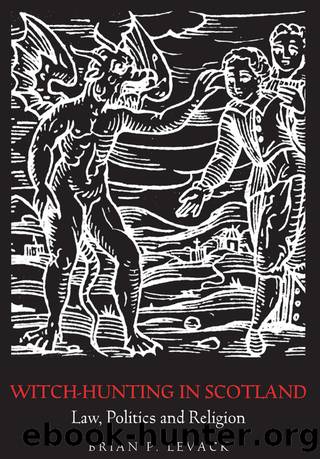Witch-Hunting in Scotland: Law, Politics and Religion by Brian P. Levack

Author:Brian P. Levack [Levack, Brian P.]
Language: eng
Format: epub
Tags: History, General, Europe, Western, Modern, 17th Century
ISBN: 9780429603907
Google: URGjDwAAQBAJ
Publisher: Routledge
Published: 2019-07-16T01:40:33+00:00
Moral discipline and the state
One of the main sources of witch-hunting zeal throughout Europe was the determination of lay and clerical elites to create a godly state, a political community characterized by the practice of a strict Christian morality. The kingdom of Scotland provides the best example of a polity in which this religious inspiration of witch-hunting was evident. In Scotland, where witchcraft was referred to in court records as a sin as well as a crime, committed against the laws of God as well as the law of Scotland, the prosecution of witches formed a major part of a Protestant campaign to achieve the moral reform of society.
The campaign to create a godly state was undertaken mainly by the reformed Protestant church, which considered witchcraft one of an entire litany of sins that needed to be punished, if not eradicated, to achieve an ideal Christian community. In this pantheon of vice, witchcraft took its place alongside fornication, adultery, incest, blasphemy, cursing, and Sabbath-breaking.32 The main agents of efforts to prosecute these forms of moral deviance were the courts of the reformed kirk â parish sessions, presbyteries, and synods â that were erected with the primary purpose of imposing a moral discipline on the population. A campaign against witchcraft, however, could not be achieved through these courts alone. Since witchcraft was a felony that could be tried only in the secular courts, the kirk could only participate in the preliminary examination of the accused before turning the testimony over to the civil magistrate. Faced with this restriction, ministers found themselves either exerting informal pressure on lay magistrates to take action against witches, urging parliament to pass legislation against witchcraft, or pressuring the privy council to intensify its prosecution of the crime. As we have seen, much of this pressure on the secular government came from the general assembly, especially during the period of its greatest influence during the revolutionary period.
The question remains whether this Protestant campaign to create a godly state by prosecuting witches had anything to do with broader process of state-building that we have been discussing. One way of addressing this question is to ask whether the government supported or initiated any such moral campaigns for political purposes. Conducting campaigns for moral reform has often proved a successful tactic for winning popular support and even legitimizing regimes in European history. A strong case can be made that the local authorities who came to power in England and Scotland in the 1640s, most notably at Newcastle in 1649, started witch-hunts in order to legitimize their recent acquisition of power. The question however is whether central authorities in Scotland took the initiative in hunting witches to strengthen the state.
In 1628 the Scottish privy council did take the initiative in inaugurating a campaign to prosecute various forms of moral deviance, including witchcraft.33 The witch-hunt of 1628â30, which was one of the largest in Scottish history (although not on the scale of the hunts of 1649â50 or 1661â2), originated in such a godly enterprise.
Download
This site does not store any files on its server. We only index and link to content provided by other sites. Please contact the content providers to delete copyright contents if any and email us, we'll remove relevant links or contents immediately.
| Africa | Americas |
| Arctic & Antarctica | Asia |
| Australia & Oceania | Europe |
| Middle East | Russia |
| United States | World |
| Ancient Civilizations | Military |
| Historical Study & Educational Resources |
Never by Ken Follett(2884)
The Man Who Died Twice by Richard Osman(2300)
Machine Learning at Scale with H2O by Gregory Keys | David Whiting(2293)
Fairy Tale by Stephen King(2072)
Will by Will Smith(2043)
Rationality by Steven Pinker(1765)
The Dawn of Everything: A New History of Humanity by David Graeber & David Wengrow(1571)
The Dark Hours by Michael Connelly(1571)
Principles for Dealing With the Changing World Order: Why Nations Succeed and Fail by Ray Dalio(1378)
Friends, Lovers, and the Big Terrible Thing by Matthew Perry(1330)
A Short History of War by Jeremy Black(1300)
HBR's 10 Must Reads 2022 by Harvard Business Review(1256)
Go Tell the Bees That I Am Gone by Diana Gabaldon(1236)
Can't Hurt Me: Master Your Mind and Defy the Odds - Clean Edition by David Goggins(1228)
515945210 by Unknown(1209)
Fear No Evil by James Patterson(1110)
443319537 by Unknown(1074)
Works by Richard Wright(1020)
Going There by Katie Couric(993)
